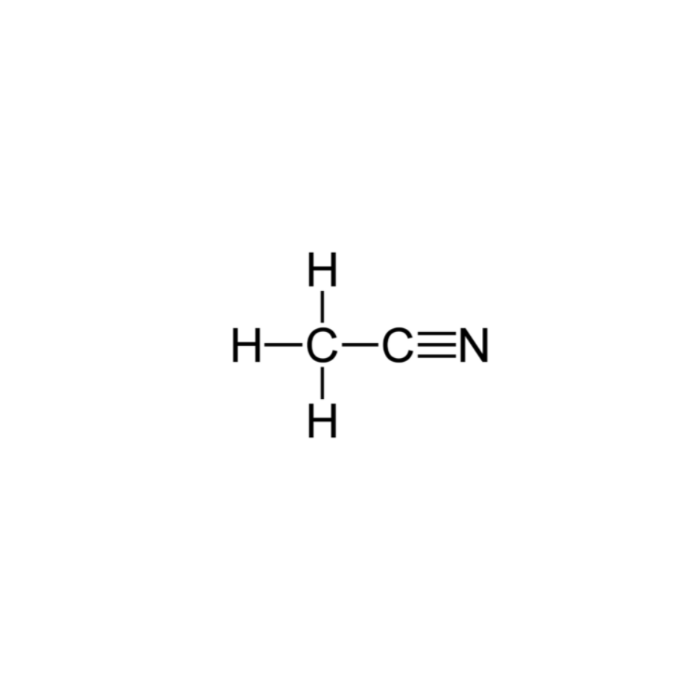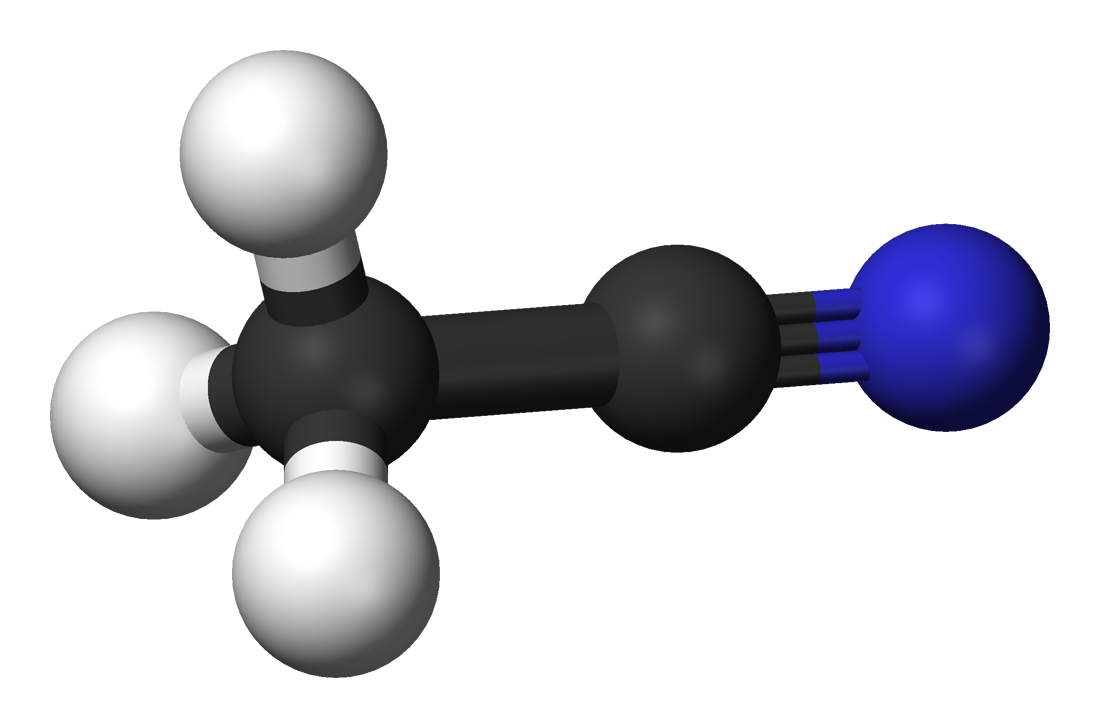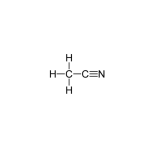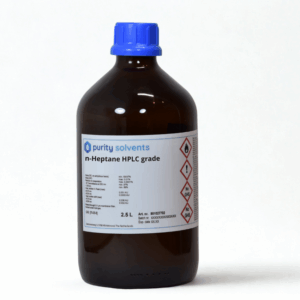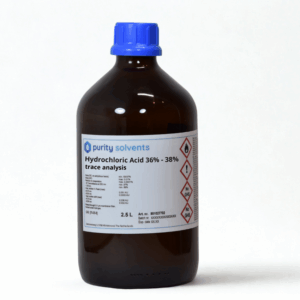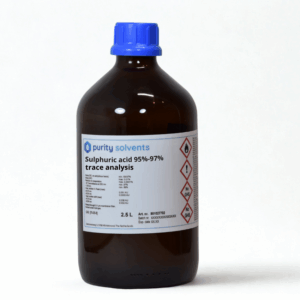Example COA
Downloads / MSDS
Description
| Catalogue Number | 801025702 |
| Synonyms | ACN, Cyanomethane, Ethyl nitrile, Methyl cyanide, CAS 75-05-8 |
| Overview | Acetonitrile is a colorless, volatile, and highly polar aprotic solvent with a faint ether-like odor. It is the simplest organic nitrile and is widely used in chemical analysis, organic synthesis, and pharmaceutical manufacturing. It has excellent solvency for both polar and non-polar compounds, making it ideal for high-performance liquid chromatography (HPLC) and extraction processes. |
Acetonitrile is a clear, colorless, and highly volatile liquid commonly used as a polar aprotic solvent in a wide range of chemical and industrial applications. With excellent solvency and miscibility in water and most organic solvents, it is especially valued in analytical laboratories for high-performance liquid chromatography (HPLC) and in organic synthesis.
Its low viscosity, high elution strength, and chemical stability make it ideal for separating and analyzing complex mixtures. Acetonitrile is also widely used in the pharmaceutical, biotech, and battery industries as a reaction medium or extraction solvent.
Due to its flammability and toxicity, it should be handled with appropriate safety measures and stored in well-ventilated, flame-proof environments.
| Formula | CH₃CN |
| Molar mass (M) | 41,05 g/mol |
| Density | 0,786 g/cm³ |
| Boiling point (bp) | 81,6 °C |
| Flash point | 2,0 °C |
| Melting point | -45 °C |
Application(s)
| Analytical Chemistry |
Widely used as a mobile phase solvent in HPLC (High-Performance Liquid Chromatography) Suitable for UV detection due to its low absorbance |
| Organic Synthesis |
Used as a reaction solvent in chemical synthesis due to its polarity and stability Ideal for reactions involving Grignard reagents, nucleophilic substitutions, and oxidations |
| Pharmaceutical Industry |
Solvent in the manufacture and purification of active pharmaceutical ingredients (APIs) Used in extraction, crystallization, and column chromatography |
| Biotechnology |
Solvent for DNA and RNA purification Used in protein precipitation and other sample preparation processes |
| Battery Industry | Component in electrolytes for lithium-ion batteries due to its high dielectric constant and low viscosity |
| Chemical Intermediates | Precursor in the production of acrylamide, pesticides, and perfumes |
| Electronics and Semiconductors | Employed in cleaning processes and solvent systems for electronic component production |
Third Party Analysis
| TEST | U.M | SPECIFICATIONSPEC. | RESULT |
| Description | APHA | A clear & colourless liquid, not more than 5 APHA in colour | Complies |
| Minimum Assay (By GC) | % | 99.95 | 99.99 |
| UV Transmission, 193 nm | % | Min. 60.0 | 70.2 |
| UV Transmission, 195 nm | % | Min. 80.0 | 87.4 |
| UV Transmission, 200 nm | % | Min. 95.0 | 97.2 |
| UV Transmission, 220 nm | % | Min. 98.0 | 98.0 |
| UV Transmission, 230 nm | % | Min. 98.0 | 98.9 |
| UV Transmission, 254 nm | % | Min. 99.0 | 99.8 |
| LC-Gradient at 210 nm | AU | Max. 0.002 | <0.002 |
| LC-Gradient at 254 nm | AU | Max. 0.0005 | <0.0005 |
| Drift at 210 nm | AU | Max. 0.01 | <0.01 |
| Drift at 254 nm | AU | Max. 0.003 | <0.003 |
| Fluorescence as quinine at 254 nm | ppb | Max. 0.5 | <0.5 |
| Fluorescence as quinine at 365 nm | ppb | Max. 0.5 | <0.5 |
| Residue on Evaporation | % | Max. 0.0002 | 0.0002 |
| Water (KF) | % | Max. 0.02 | 0.010 |
| Acidity as CH3COOH | % | Max. 0.002 | 0.00056 |
| Alkalinity as NH3 | % | Max. 0.0002 | Nil |
| Filtered through 0.2 µm membrane filter. Packed under inert gas |
Become a Partner of Purity Solvents
 Partner with us to access the highest quality, REACH-compliant industrial-grade solvents.
Partner with us to access the highest quality, REACH-compliant industrial-grade solvents.Ensure purity, reliability, and compliance for your business. Sign up today and streamline your sourcing with confidence!
 Partner with us to access the highest quality, REACH-compliant industrial-grade solvents.
Partner with us to access the highest quality, REACH-compliant industrial-grade solvents.Ensure purity, reliability, and compliance for your business. Sign up today and streamline your sourcing with confidence!
Safety Information according to GHS
| Hazard Pictogram(s) |   |
| Hazard Statement(s) | H225: Highly flammable liquid and vapour. H225 Highly flammable liquid and vapour. H302 Harmful if swallowed. H312 Harmful in contact with skin. H319 Causes serious eye irritation. H332 Harmful if inhaled. |
| Precautionary Statement(s) | PP210 Keep away from heat, hot surfaces, sparks, open flames and other ignition sources. No smoking.
P233 Keep container tightly closed. P271 Use only outdoors or in a well-ventilated area. P240 Ground and bond container and receiving equipment. P241 Use explosion-proof electrical/ventilating/lighting/intrinsically safe equipment. P242 Use non-sparking tools. P243 Take action to prevent static discharges. P261 Avoid breathing mist/vapours/spray. P264 Wash all exposed external body areas thoroughly after handling. P270 Do not eat, drink or smoke when using this product. P280 Wear protective gloves, protective clothing, eye protection and face protection. P370+P378 In case of fire: Use alcohol resistant foam or fine spray/water fog to extinguish. P305+P351+P338 IF IN EYES: Rinse cautiously with water for several minutes. Remove contact lenses, if present and easy to do. Continue rinsing. P337+P313 If eye irritation persists: Get medical advice/attention. P301+P312 IF SWALLOWED: Call a POISON CENTER/doctor/physician/first aider if you feel unwell. P302+P352 IF ON SKIN: Wash with plenty of water. P303+P361+P353 IF ON SKIN (or hair): Take off immediately all contaminated clothing. Rinse skin with water [or shower]. P304+P340 IF INHALED: Remove person to fresh air and keep comfortable for breathing. P330 Rinse mouth. P362+P364 Take off contaminated clothing and wash it before reuse. |
| Signal Word | Danger |
| Storage class | 3 Flammable liquids |
| WGKs | WGK 2 hazardous to water |
| Disposal | Dispose of contents/container to authorised hazardous or special waste collection point in accordance with any local regulation. |
Storage and Transport Information
| Storage | Store in a well ventilated area. |
| Declaration (railroad and road) ADR, RID | UN 1648 , 3, II |
| Declaration (transport by air) IATA-DGR | UN 1648 , 3, II |
| Declaration (transport by sea) IMDG-Code | UN 1648 , 3, II |
Toxicological Information
| LD 50 oral | LD50 Rabbit 50 mg/kg |
| LD 50 dermal | LD50 Rabbit >2000 mg/kg |


